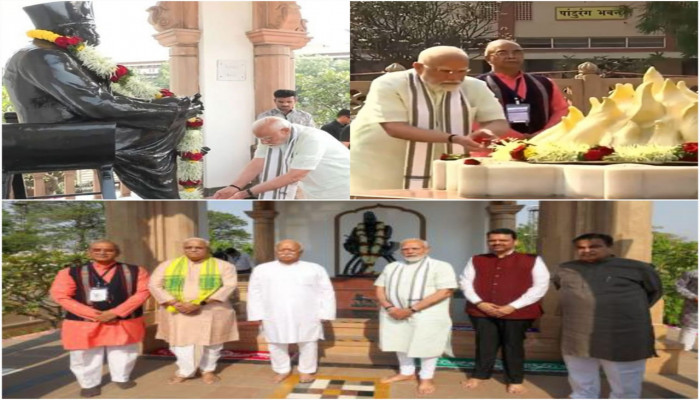PM Modi's visit to RSS headquarters signals strengthened BJP-Sangh relations
- In Reports
- 04:00 PM, Mar 31, 2025
- Myind Staff
Prime Minister Narendra Modi visited the RSS headquarters in Nagpur on Sunday for the first time since taking office in 2014. During his visit, he expressed strong appreciation for the organisation. This move is viewed as a shift in the BJP’s approach toward its ideological parent, especially after their reportedly strained relations last year.
“The RSS is India’s huge banyan tree of immortal culture and modernisation. Whereas, the lakhs and crores of swayamsevaks are like its stems and branches selflessly serving the country with unwavering dedication and commitment,” Modi stated.
Modi’s visit to the Hedgewar Smruti Mandir, a memorial dedicated to the first two RSS chiefs, K.B. Hedgewar and M.S. Golwalkar, has come as an unexpected yet welcome move, even for many within the Sangh. It is widely perceived as an effort by the BJP and RSS to reconcile differences and present a united front.
“It is no secret that the RSS is the ideological mentor of the BJP. However, former PMs and senior BJP leaders in the past have exercised caution and ensured a distinction between the government and the Sangh. Even though many leaders have credited the Sangh in shaping their careers, they have made it clear that it did not influence or drive their governance or political agenda,” stated a senior RSS functionary.
The Prime Minister’s visit comes nine months after the BJP, for the first time in ten years, saw its Lok Sabha seats drop below the majority mark in the last elections. This happened amid reports of tensions between the party and the RSS.
Before the elections, BJP president J.P. Nadda had stated in an interview with The Indian Express that the party had evolved beyond its earlier dependence on the RSS and was now “self-sufficient” in managing its affairs. However, after its setback in the Lok Sabha polls, the BJP appeared to change course. Reports suggest that by re-engaging with the Sangh, the party secured decisive victories in the Haryana, Maharashtra and Delhi Assembly elections.
Senior RSS leader Seshadri Chari dismissed speculations about differences, arguing that such discussions were started by “those who did not understand the BJP and Sangh.” Meanwhile, BJP poll strategists acknowledged that the RSS had “strong reservations” about the party’s growing focus on personality-driven politics as it continued to contest elections on the “Moditva plank” under its “post-2014 Modi brand of politics.”
Prime Minister Narendra Modi, once an RSS pracharak, shared the stage with RSS chief Mohan Bhagwat, first at the Hedgewar Smruti Mandir and later at the Madhav Netralaya Premium Centre. This joint appearance signifies the “narrowing differences” between the BJP and the Sangh. The two leaders had previously shared the Ayodhya stage during the Ram Temple's consecration in January last year.
Modi described his visit to the memorial as an “overwhelming” experience, stating, “The memorial of two strong pillars of RSS is an inspiration to lakhs of swayamsevaks who have dedicated themselves to the service of the nation.”
The Prime Minister's visit to Nagpur, coming just before two significant events, the RSS' centenary celebrations and the BJP's National Executive meeting in Bengaluru, indicates improving relations between the two organisations. This visit is also essential as the BJP will announce its new national president during the next month's Bengaluru meeting.
In this context, the Prime Minister’s remarks about the RSS, describing it as an organisation that has “upheld the highest principles of ‘samparpan (dedication)’ and ‘seva (service)’,” are being seen as part of the BJP’s efforts to not only recognise and acknowledge the Sangh’s contributions but also to legitimise its role in the “2047 Viksit Bharat” vision by emphasising its “constructive role in nation building and development.”
“The RSS is our ideological mentor. Today, PM Modi reiterated the Sangh’s role in nation-building and the country’s development,” stated Maharashtra BJP chief Chandrashekhar Bawankule.
While many Sangh-affiliated organisations engage in social work nationwide, critics remain sceptical of their intentions and frequently accuse them of “peddling its hidden agenda.” For example, their advocacy for the Ram Temple and the abrogation of Article 370, issues that were set aside during earlier NDA governments to maintain harmony with allies, has led to accusations of being “anti-Muslim.”
Modi’s acknowledgement of swayamsevaks for their “important role” in the recent Maha Kumbh Mela at Prayagraj is being seen as an indication that some of the RSS’ key priorities are regaining prominence in the BJP’s political approach. This also coincides with the Centre’s recent decision to remove restrictions that bar government employees from participating in RSS-led social activities.







Comments